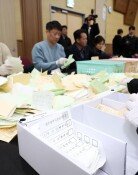[Editorial] Teachers Should Discard Their Selfishness
[Editorial] Teachers Should Discard Their Selfishness
Posted July. 25, 2009 08:05,
The Presidential Education Advisory Commission yesterday announced a plan for future education on cutting the number of mandatory subjects and giving schools more autonomy to provide customized curricula.
Middle and high school students take around 13 courses per semester, more than the eight taken by students in the U.S. and England. Though Korean students face a bigger burden, they have shown weaker performance than their counterparts in advanced economies. The domestic curriculum offers too many electives. For example, Korean is divided into six courses: speech, reading, grammar, literature, writing and media language. Since students must take around three courses among the six, they apply for relatively easy courses. As students avoid tough courses and struggle to get high scores, their academic ability has gotten weaker.
The new educational policy suggests that the number of obligatory school years be reduced to nine from 10. By doing so, the panel said high school principals can offer differentiated educational programs. If students are allowed to choose which high schools they attend from next year in Seoul, high schools will struggle to provide differentiated curricula to draw students.
Teachers who teach classes scheduled for downsizing are understandably opposed to the idea. Some even argue that the new plan will put a heavier burden on students as Korean, English and math will account for a larger share in the curriculum. In reality, however, the subject of geography is divided into three courses: local, global and economic. Students must choose elective courses depending on what their teachers majored in at university. Teacher resistance results from their selfishness, not from sincere consideration of students.
If teachers opinions are fully reflected, the governments educational reform will ultimately fail. The new curriculum should be simplified to foster future-oriented and talented students. Under the plan, principals will play a critical role in developing curricula. They should be allowed to yield full authority to follow their own educational philosophy, establish curricula, and assign subjects to teachers. For their part, principals should do their best to improve the educational system instead of currying favor with the Korean Teachers and Educational Workers Union and finishing their terms avoiding difficulty.







